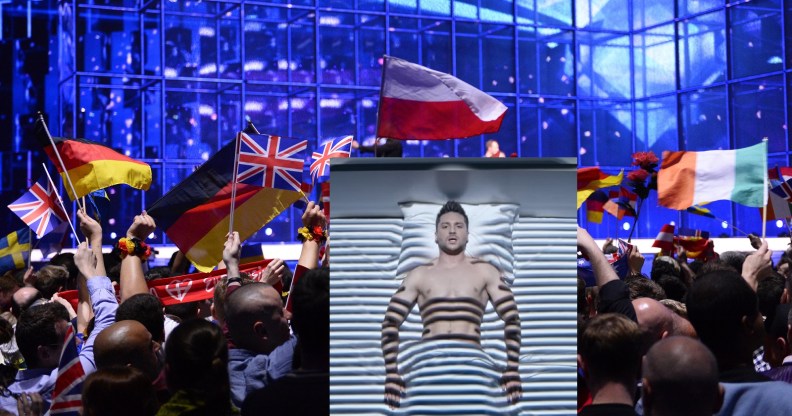Eurovision bans ‘political’ waving of rainbow flags during Russian entry

PinkNews Exclusive
The Eurovision Song Contest has warned fans not to wave their rainbow flags in a “political” manner during Russia’s entry – while the Scottish Saltire has been banned under rules on ‘regional’ flags.
The camp contest is set to take place in Stockholm next month, with Russia’s Sergey Lazarev currently favourite to take the trophy.
Ahead of the first semi-final on May 10, the contest’s steering committee has released a ‘flag policy’, specifying which flags can and cannot be flown by fans in the Globen Arena.
The policy limits flags to the flags of participating members and other UN states, along with the rainbow flag and the EU flag.
However, the section on the rainbow flags warns fans not to wave them as a “political tool”.
It states: “Rainbow flags and the European Union flag will be tolerated provided they will, according to the evaluation of the organisers, not be used as tool to intentionally make a political statement during the show.
“Particularly, the organisers request and urge the fan community to respect and appreciate the non-political nature of the Eurovision Song Contest.”
PinkNews queried how waving a flag could be a ‘political statement’, and queried whether this is referring to fans flying the flag during Russia’s entry.
A Eurovision spokesperson told PinkNews: “This is decided on a case by case basis. The example you cite earlier may be applicable – singling out a specific participating country.”
In the past the contest organisers have repeatedly attempted to smooth over Russia’s tumultuous relationship with the contest’s large gay following – deploying ‘anti-booing’ tech last year to minimise repeated heckling of the Russian entry.
The policy also specifies that “local, regional or provincial flags” are not allowed to be flown – with the Palestinian flag among those specifically listed as an example of a banned flag. The flag of ISIS is also banned.
PinkNews has asked for clarification on whether this means the Scottish Saltire or Australian Aboriginal Flag would be banned.

A spokesperson confirmed that neither would be permitted, adding: “Scotland is not a member of the UN so therefore the flag does not comply with the policy.”
A statement said: “The EBU aims to assure that the Eurovision Song Contest is free from political statements, unauthorised commercial messages and offensive comments, in line with the contest’s Rules that all 42 participating broadcasters agreed upon.
“The organisers are fully committed the safety of the audience and crew. For these purposes, the Reference Group of the Eurovision Song Contest, which is the contest’s governing body on behalf of the participating broadcasters, decided on a flag policy.
“Regarding the rainbow flag, that technically represents diversity which is a core value of the EBU.”
Earlier this year, organisers announced a drastic shake-up to voting and results system.
The new system cuts down on the roles of the ‘national spokespeople’ – who will now just briefly announce the winner of their jury vote, rather than read out a list of scores..

